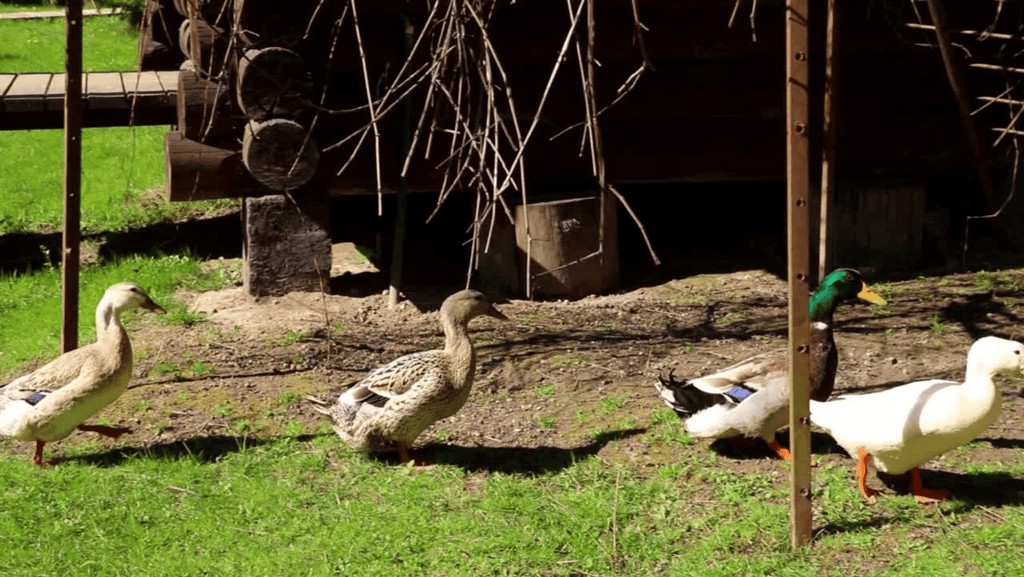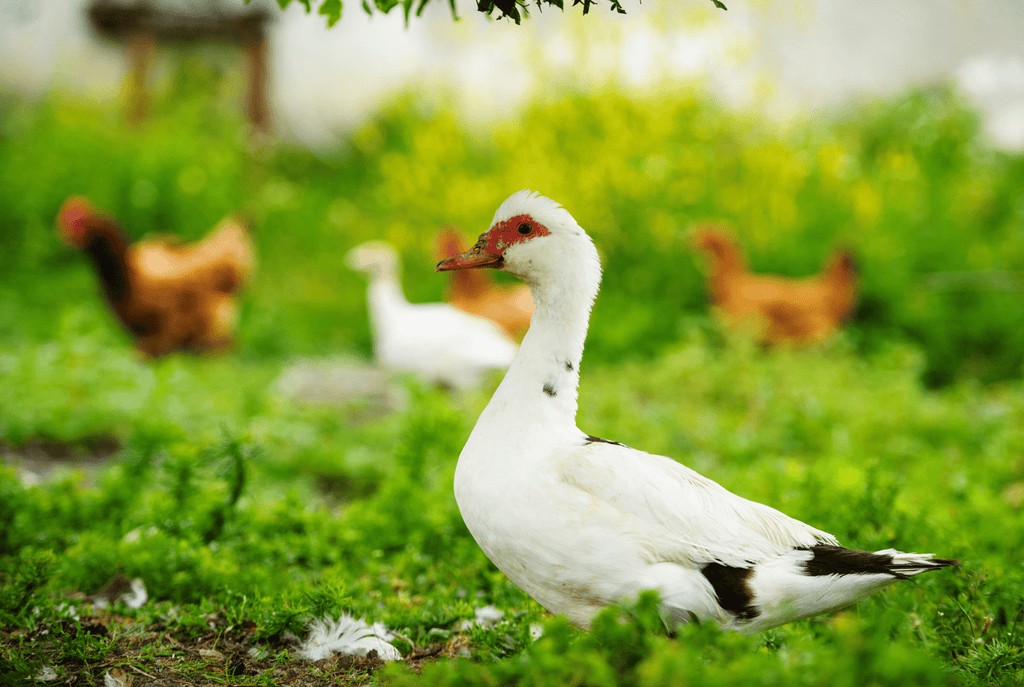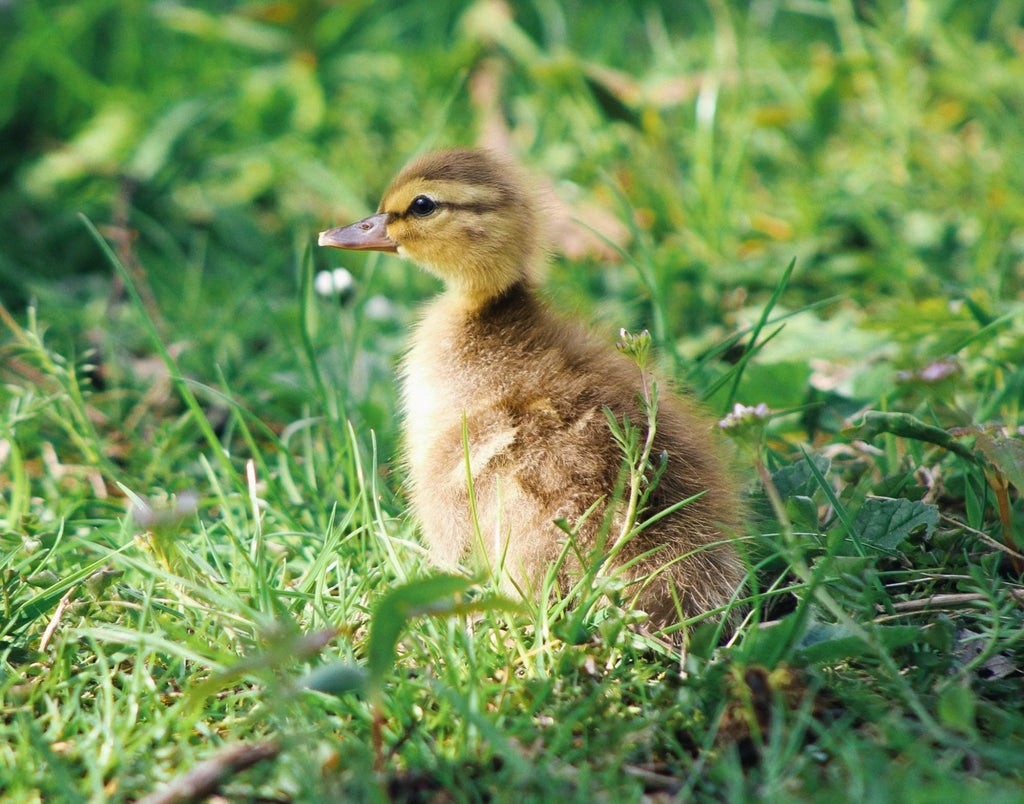What Can You Feed Pet Ducks? Ensuring your pet ducks receive the right nutrition is crucial for their overall health, happiness, and well-being. At PETS.EDU.VN, we are committed to providing you with expert guidance on duck nutrition, helping you create a balanced diet that meets all their unique needs. Discover the delightful world of duck cuisine and unlock the secrets to keeping your feathered friends thriving with our ultimate guide to pet duck feeding.
1. Understanding Your Ducks’ Dietary Needs
Backyard ducks need a well-rounded diet of foraging and owner-provided food for a happy and healthy life. A complete and balanced diet is essential, particularly for laying ducks, as deficiencies can cause soft eggs or health problems like angel wing syndrome.
1.1 The Omnivorous Nature of Ducks
Ducks are omnivores, meaning they consume a variety of foods. In the wild, they would forage for:
- Vegetables
- Insects
- Fruits
- Grains
- Seeds
- Berries
- Frogs
- Small Fish
Since maintaining this diverse menu can be challenging, many duck owners rely on high-quality, balanced poultry feed, enhanced with supplements to meet their nutritional requirements. Remember that ducks also need shell grit and a consistent supply of fresh water. Consider using All Flock Feed, which is enriched with niacin to promote optimal health.
1.2 Key Nutritional Components
A balanced diet will ensure that your ducks grow strong and healthy. Layer feed is especially beneficial for ducks that lay eggs, as it supports the production of high-quality eggs with robust shells. Veterinarians generally advise feeding ducks twice a day, with a slightly smaller meal in the morning. Begin feeding layer feed about a month before the first eggs are laid.
1.3 Detailed Nutritional Breakdown
According to North Carolina State University’s Poultry Extension, the following nutritional requirements are essential for ducks:
| Nutrient | Requirement for Adult Layers | Requirement for Non-Layers |
|---|---|---|
| Protein and Energy | 1,300 calories per day, 16% protein | Same |
| Lysine | 0.75% | Same |
| Arginine | 0.85% | Same |
| Methionine & Cystine | 0.65% combined | Same |
| Linoleic Acid | 1% | Same |
| Calcium | 2.9% | 0.7% |
| Phosphorus | 0.35% | Same |



In addition to these macronutrients, ducks need a range of vitamins and minerals to stay healthy.
Alt text: Happy ducks eagerly approach their food bowl, excited for mealtime.
1.4 Essential Vitamins and Minerals for Ducks
| Minerals | Vitamins |
|---|---|
| Potassium | Vitamin A |
| Sodium | Vitamin D3 |
| Chlorine | Vitamin E |
| Magnesium | Riboflavin |
| Manganese | D-Pantothenic acid |
| Zinc | Niacin |
| Iron | Choline |
| Copper | Biotin |
| Iodine | Folic Acid |
| Cobalt | Thiamin |
| Selenium | Pyridoxine |
| Ethoxyquin |
2. Comparing Duck and Chicken Diets
If you manage a mixed flock of ducks, chickens, and other birds, a base diet of poultry feed works well for everyone. However, ducks have specific dietary needs that must be addressed.
2.1 Niacin Requirements
Ducks and ducklings require approximately twice as much niacin (Vitamin B3) as chickens. Niacin is vital for skeletal development, and a deficiency can lead to health problems. Feeds like Little Pecks, Fresh Pecks, and All Flock are formulated with ample niacin. If you use a feed without added niacin, you can supplement it with brewer’s yeast.
2.2 Feed Texture
It’s best to give ducks pellet feed instead of crumbles. Crumbles can cause digestive issues and blockages. Pellets also help ducks feel fuller, reducing the risk of overeating and rapid weight gain.
Alt text: A Moscovy duck peacefully coexists with chickens, highlighting the possibility of mixed-species flocks.
3. Foods to Avoid Feeding Your Ducks
As a duck parent, you might wonder which food scraps and leftovers your ducks can enjoy. When separating compost from potential duck treats, make sure to avoid these items:
3.1 Harmful Foods for Ducks
- Citrus: Lemons, limes, and other citrus fruits can interfere with calcium absorption.
- Nightshades: Unripe tomatoes and eggplants can contain poisonous alkaloids.
- Dairy: Ducks and other birds struggle to digest milk, cheese, and other dairy products.
- Bread Products: These offer little to no nutritional value and are essentially junk food for ducks.
- Sweets: Too much sugar can cause weight gain and strain on ducks’ legs.
- Salty Snacks: Ducks are prone to salt overdose, which can be fatal.
- Moldy Foods: Mold can cause lung infections and other diseases.
4. Essential Feeding Practices for Ducks
Besides the type of food you provide, other factors ensure your ducks remain happy and healthy.
4.1 Access to Fresh Water
Ducks have a unique eating style. They often dip their beaks into water to help swallow their food, a behavior known as “dabbling.” Always keep fresh, clean water near their food bowls to prevent choking.
4.2 Spill-Proof Bowls
Ducks tend to knock over their feed bowls due to their wide feet and enthusiastic feeding habits. Use wide, flat bowls with heavy bases to prevent spills.
4.3 Providing Grit
Ducks lack teeth and rely on small rocks, pebbles, or grit to grind their food. Provide poultry grit to aid in digestion.
4.4 Food Storage
Mold is dangerous for ducks. Store their feed in a dry, cool place. An airtight container will also protect against pests.
4.5 Healthy Snacks
Mental enrichment is crucial for ducks, and healthy snacks are a great way to provide it. Offer Grubblies to mimic their natural diet of insects and foraging behavior. Sprinkling Grubblies in water can also encourage hydration during hot weather.
5. Optimal Diet for Ducklings
Ducklings have unique dietary needs, similar to baby chicks. They can consume balanced chick starter feed.
5.1 Chick Starter Feed
Chick starter grower feed, like Little Pecks, provides the ideal crumb size and the necessary niacin for growing ducklings.
5.2 Feeding Frequency
Ducklings need more frequent meals than adult ducks. Ideally, provide a free-choice diet where they can eat whenever they’re hungry. If this isn’t possible, feed them at least three times a day, with 4 to 6 meals being ideal.
5.3 Avoid Layer Feed
Do not feed ducklings layer feed as their primary diet, as it often contains high levels of calcium that can be toxic to them.
5.4 Niacin Needs for Ducklings
Choose a chick starter feed with at least 25 mg/lb of niacin to support strong bone and joint development. Little Pecks is formulated with 38.77 milligrams of niacin per pound, so you don’t have to supplement it. If you’re using a feed that requires supplementation, brewer’s yeast, beets, fish, rolled oats, and sunflower seeds are excellent sources of niacin. Excess niacin will simply be excreted.
5.5 Protein Requirements for Ducklings
Ducklings need plenty of protein in their first two weeks. If your chick feed has less than 20% protein, supplement it with a source like Grubblies. Always provide grit when offering snacks.
After the first two weeks, reduce protein intake to between 16% and 18% until they are 20 weeks old. If your starter feed has a higher protein level, replace up to 20% of their feed with rolled oats.
5.6 Medicated vs. Unmedicated Feed
Many chick feeds contain medication that isn’t ideal for ducklings. Because ducklings eat more than chicks, medicated feed can lead to overdoses. Additionally, ducklings are hardier and less prone to disease, making medicated feed unnecessary.
5.7 Transitioning to Adult Feed
When ducklings reach 20 weeks of age or begin laying, you can transition them to adult layer feed. A feeding guide can help you transition them smoothly from Little Pecks to Fresh Pecks layer feed.
Alt text: A cute duckling excitedly anticipates its next meal, showcasing its adorable charm.
6. Feeding Ducks for Health and Happiness
Raising backyard ducks is a fulfilling experience. Over time, your ducks will recognize your routine and eagerly await their meals and snacks. Ensure their meals are the best they can be with a diet rich in protein, healthy calories, amino acids, and essential nutrients.
6.1 Recommended Feeds
- Little Pecks for ducklings
- Fresh Pecks Crumbles or All Flock Layer Feed for adult ducks
These feeds make providing a fulfilling diet easy.
7. Understanding the Impact of Diet on Duck Health
A balanced diet is critical for maintaining the overall health of your ducks. Proper nutrition can prevent various health issues and ensure they live a long and happy life.
7.1 Common Nutritional Deficiencies
Nutritional deficiencies can lead to serious health problems in ducks. Recognizing the signs and symptoms of these deficiencies is crucial for timely intervention.
| Deficiency | Symptoms | Prevention |
|---|---|---|
| Niacin Deficiency | Stunted growth, leg weakness, bowed legs | Ensure feed contains adequate niacin (25+ mg/lb) or supplement with brewer’s yeast |
| Vitamin D Deficiency | Soft eggshells, bone deformities | Provide access to sunlight or supplement with Vitamin D |
| Calcium Deficiency | Thin or soft eggshells, reduced egg production | Ensure adequate calcium intake, especially for laying ducks |
| Protein Deficiency | Slow growth, poor feather development, reduced egg production | Ensure feed has adequate protein (16-20%, depending on age) and supplement if necessary |
7.2 Obesity in Ducks
Overfeeding, especially with treats high in carbohydrates, can lead to obesity in ducks. Obese ducks may experience difficulty moving, breathing problems, and increased risk of other health issues.
7.3 Toxic Foods and Their Effects
Some foods can be toxic to ducks and should be avoided at all costs. These include:
- Avocados: Contain persin, which is toxic to birds.
- Chocolate: Contains theobromine, which is toxic to birds.
- Onions and Garlic: Can cause anemia in birds.
8. Foraging and Supplementation
Ducks naturally enjoy foraging for food. Providing opportunities for foraging can enrich their diet and provide mental stimulation.
8.1 Encouraging Natural Foraging
Allowing ducks to forage in a safe, pesticide-free area can provide them with a variety of natural foods, including insects, plants, and seeds. This not only supplements their diet but also keeps them active and engaged.
8.2 Safe Foraging Practices
- Ensure the foraging area is free from hazards such as toxic plants, sharp objects, and standing water that could harbor harmful bacteria.
- Supervise foraging activities to prevent ducks from consuming harmful substances.
- Provide a balanced feed even when ducks are foraging to ensure they receive all necessary nutrients.
8.3 Supplementing with Safe Treats
In addition to foraging, you can supplement your ducks’ diet with safe and healthy treats.
| Treat | Benefits |
|---|---|
| Mealworms | High in protein, great for molting or growth |
| Berries | Rich in antioxidants and vitamins |
| Leafy Greens | Good source of vitamins and fiber |
| Cooked Rice | Provides carbohydrates for energy |
| Watermelon | Hydrating and rich in vitamins (remove seeds) |
| Pumpkin Seeds | Good source of zinc and other minerals |
9. Seasonal Feeding Adjustments
Ducks’ dietary needs can change with the seasons. Adjusting their diet accordingly can help them stay healthy and comfortable year-round.
9.1 Summer Feeding
During the summer, ducks may need more hydration. Offer plenty of fresh water and hydrating treats like watermelon and cucumbers. Reduce the amount of high-energy feed if they are less active due to the heat.
9.2 Winter Feeding
In the winter, ducks need more calories to stay warm. Increase their feed portion and offer high-energy foods like corn and oats. Ensure they have access to unfrozen water at all times.
9.3 Molting Season
Ducks molt, or shed their feathers, once or twice a year. During this time, they need extra protein to support new feather growth. Supplement their diet with mealworms or other high-protein treats.
10. Expert Tips from PETS.EDU.VN
At PETS.EDU.VN, we are dedicated to providing comprehensive information to help you care for your pet ducks. Here are some expert tips to ensure your ducks thrive:
10.1 Consult with a Veterinarian
Regular check-ups with a veterinarian experienced in poultry care can help identify and address any health issues early on. A vet can also provide personalized dietary recommendations based on your ducks’ specific needs.
10.2 Monitor Body Condition
Regularly assess your ducks’ body condition to ensure they are neither underweight nor overweight. You should be able to feel their keel bone (breastbone) without it being too prominent or buried in fat.
10.3 Provide Enrichment
Ducks need mental and physical stimulation to stay healthy and happy. Provide them with opportunities to swim, forage, and interact with each other. Toys and enrichment activities can also help prevent boredom and destructive behaviors.
10.4 Keep Feeding Areas Clean
Regularly clean feeding areas to prevent the growth of bacteria and mold. Use clean bowls and waterers, and remove any uneaten food promptly.
11. Frequently Asked Questions (FAQ)
1. Can ducks eat chicken feed?
Yes, ducks can eat chicken feed, but it’s essential to ensure it meets their higher niacin requirements. Supplement with brewer’s yeast if necessary.
2. Is bread bad for ducks?
Yes, bread offers little nutritional value and can lead to health problems. It’s best to avoid feeding bread to ducks.
3. What are good treats for ducks?
Safe and healthy treats for ducks include mealworms, berries, leafy greens, and cooked rice.
4. How often should I feed my ducks?
Adult ducks should be fed twice a day, while ducklings need to be fed 3-6 times a day.
5. Can ducklings eat layer feed?
No, layer feed contains too much calcium for ducklings and can be toxic. Use a chick starter feed instead.
6. What do I do if my duck has angel wing?
Consult with a veterinarian. Angel wing can be caused by a high-protein diet and lack of exercise.
7. How much water do ducks need?
Ducks need constant access to fresh, clean water for drinking and dabbling.
8. Can ducks eat vegetables?
Yes, many vegetables are safe and healthy for ducks, including leafy greens, cucumbers, and carrots.
9. Are there any plants that are poisonous to ducks?
Yes, some plants are poisonous to ducks, including nightshade plants, buttercups, and azaleas.
10. How do I ensure my ducks are getting enough protein?
Choose a feed with adequate protein levels (16-20%) and supplement with high-protein treats like mealworms if needed.
12. Call to Action
Want to learn more about providing the best care for your pet ducks? Visit PETS.EDU.VN for in-depth articles, expert advice, and personalized support. Whether you’re looking for nutritional guidelines, health tips, or behavioral insights, we’re here to help you ensure your feathered friends live long, healthy, and happy lives. Contact us at 789 Paw Lane, Petville, CA 91234, United States, WhatsApp: +1 555-987-6543, or visit our website at pets.edu.vn today!
